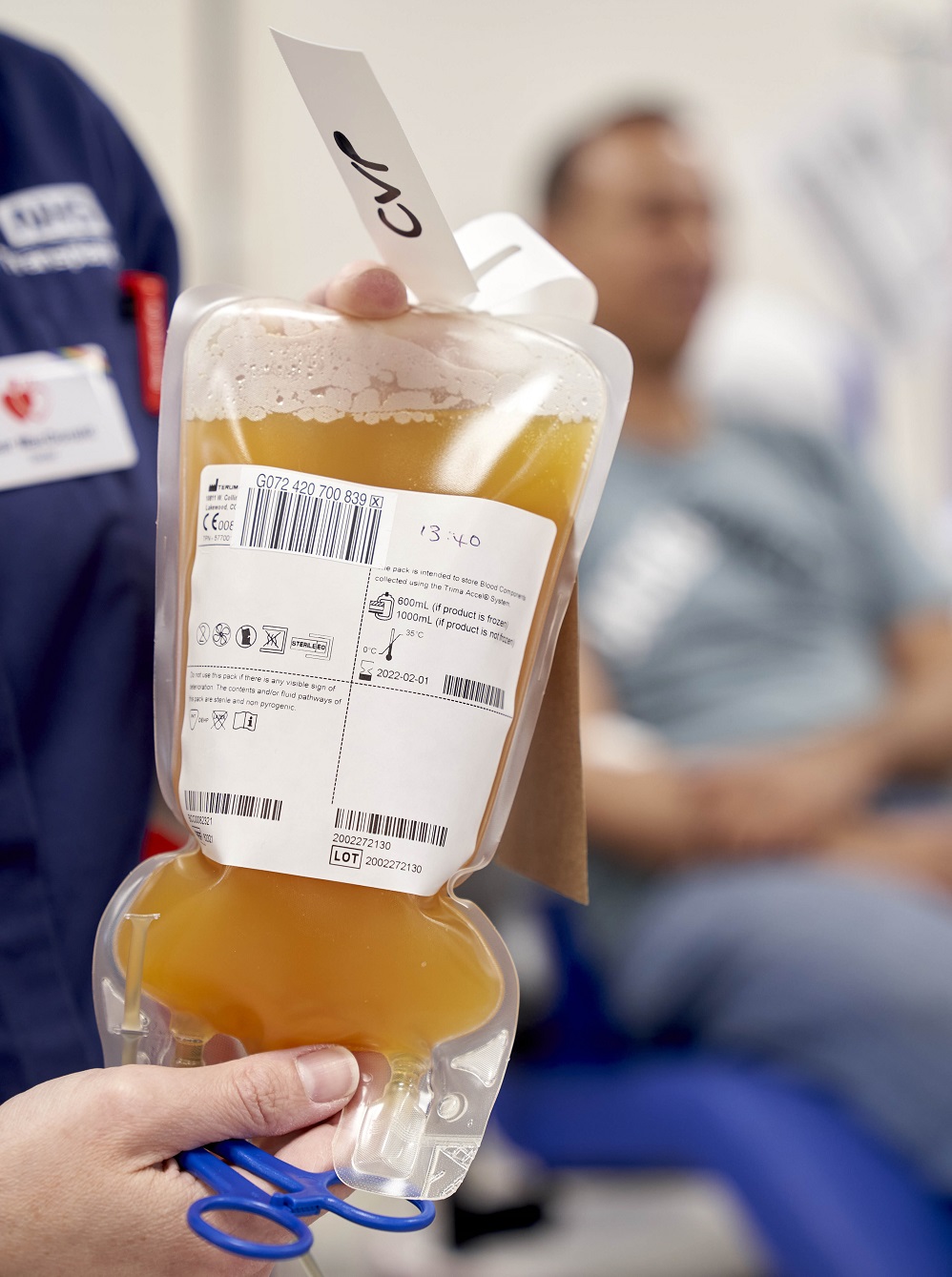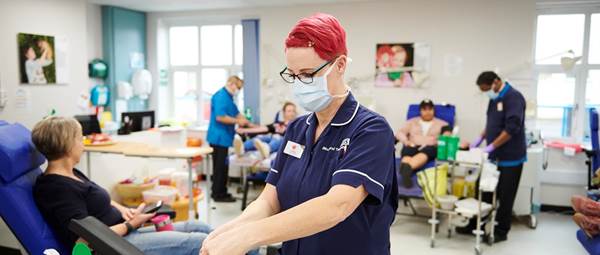Convalescent plasma donor with highest coronavirus antibodies backs call for more donors from three key groups
Initial tests on convalescent plasma donations from recovered COVID-19 patients has indicated three key groups of people who have the plasma most likely to potentially save lives.
NHSBT is collecting convalescent plasma for a major coronavirus treatment trial, and if the trial is successful, widespread use in hospitals. The antibody rich plasma of people who have recovered can be transfused into people who are struggling to develop their own immune response.
NHS Blood and Transplant found plasma antibody levels that were high enough for potentially lifesaving transfusions were more likely to come from recovered COVID-19 patients who were:
- male
- aged over 35
- ill enough to have needed hospital treatment
NHS Blood and Transplant is now urging people recovered from COVID-19 and who fall into one or more of these three groups (1), and who live near one of NHSBT’s 23 donor centres (2), to offer to donate by calling 0300 123 23 23 or completing our online form.
Donors whose plasma contains higher antibody levels are more likely to be able to benefit patients and more likely to be able to keep donating for several months to come.
NHSBT analysed antibody levels from more than 400 convalescent plasma donations. (3)
The donor whose plasma had the highest antibody level of those measured so far is Alessandro Giardini, 46, of Camden in London. (4)
 Alessandro falls into all three of the categories of donors identified as associated with higher antibody levels - he is male, he is aged over 35, and he was hospitalised.
Alessandro falls into all three of the categories of donors identified as associated with higher antibody levels - he is male, he is aged over 35, and he was hospitalised.
His antibody level was 1 in 2560. That means his antibodies can still be detected in a sample that is 1 part plasma and 2559 parts diluent.
His antibody level is around 40 times that of the typical convalescent plasma donation to NHSBT so far.
Alessandro, who is a Consultant at Great Ormond Street Hospital, spent seven days on a ventilator in intensive care after falling ill with COVID-19.
He said: "I ended up on a ventilator in the Intensive Care Unit for seven days, I was in the hospital for 15 days in total. I was in the Royal Free and the care was exceptional.
"It was a very hard experience, not knowing if you will see your family again - I have two young children.
"I was aware of the convalescent plasma donation programme so I was expecting the call to come in and donate. I felt I had to give back.
"Even though it was scary to go back into a medical environment and have a needle again, I really felt that if there was any chance I could help someone else who was still ill with COVID-19, that I needed to do it.
"I felt great after donating plasma. It feels like we are in one interconnected community, helping each other. I was very much pleased and proud to have donated.”
Prof David Roberts, NHS Blood and Transplant’s Associate Medical Director for Blood Donation, said: “These testing results mean we want hear from those who want to give convalescent plasma and especially want to hear people from men, the over 35s, and all people who needed hospital treatment.
“If you have recovered from a coronavirus infection, fall into any one of the these groups, and live near or could travel to one of our 23 donor centres, please contact us on 0300 123 23 23 or via our website.
“These initial results are in line with past findings. People who are more seriously ill produce more antibodies, which can be transfused to potentially help others. The evidence so far is that men and older people are more seriously affected by coronavirus.
“Please help your NHS fight COVID-19. Convalescent plasma donation is safe and easy and you could save lives. If you get the call, please donate.”
What is convalescent plasma?
 Convalescent plasma is the antibody rich plasma of people who have recovered from COVID-19, which can be given to people who are struggling to develop an immune response to overcome the illness.
Convalescent plasma is the antibody rich plasma of people who have recovered from COVID-19, which can be given to people who are struggling to develop an immune response to overcome the illness.
Although there is some evidence of patient benefit from the use of convalescent plasma, the safety and effectiveness of convalescent plasma transfusions needs to be confirmed by a robust clinical trial.
The trial is being carried out through NHSBT’s Clinical Trials Unit, led by Dr Lise Estcourt. There has never been a full randomised control trial of the potential benefits of convalescent plasma for any virus.
Collection programme and treatment
NHSBT is leading a major programme on behalf of the Government to collect convalescent plasma for a major trial, and if the trial is successful, widespread use in hospitals.
Each donor donates two units and each patient receives two units. Transfusions have started although the effectiveness of plasma treatment will not be known until the trial finishes. Results are expected in the late summer. Convalescent plasma can also be frozen and stored ahead of any second wave of infection.
To enable large scale collection, plasma will be collected at the 23 donor centres and collected in temporary donation spaces. 21 nurses from Superdrug are volunteering in collection teams. There is a particular need for people to come forward as donors in Manchester, London and Birmingham.
(1) We would welcome donors who fall into one or more of those categories, they do not necessarily need to demonstrate all three i.e. a 33 year old woman who was treated in hospital should still get in touch.
(2) NHSBT’s 23 donor centres are in London (Tooting, Edgware, West End), Manchester (Plymouth Grove and Norfolk House), Cambridge, Luton, Nottingham, Sheffield, Leicester, Bradford, Leeds, Newcastle, Lancaster, Liverpool, Stoke, Birmingham, Bristol, Gloucester, Oxford, Southampton, Poole and Plymouth
(3) Data from 435 Convalescent Plasma donors between 21 April and 11 May 2020.
- Male donors - Men were twice as likely (34%) to have high enough antibody levels compared to women (17%)
- Aged 35 and over - Of donors aged 35-45, 31% had high enough antibody levels for transfusion, and this rose to 40% of those aged over 45 years. Only 10% of people aged under 35 had high enough antibody levels.
- Needed admitting to hospital - 70% of those hospitalised had high enough antibody levels. This compared to 31% of donors who had a positive test for COVID-19 but who did not require hospital treatment.
Convalescent plasma donations are tested for antibody levels before they are transfused. Donations with low antibody levels are not used for patients as the plasma may not be effective and may even cause problems.
(4) One other donor’s plasma had the same antibody level but the individual had to be withdrawn from donation.
